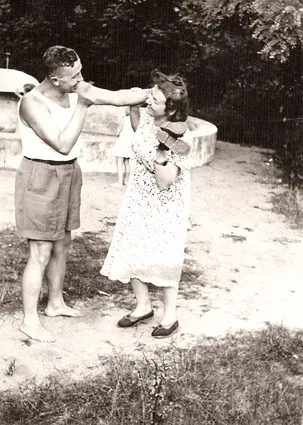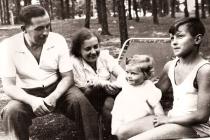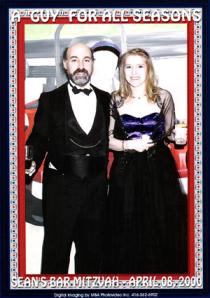This is me, Helena Najberg, with my husband Jakub Najberg. I don’t know where and when the photo was taken. It must have been taken by some photographer or friend but I don’t remember exactly.
Jakub, my husband, was born on 2nd February 1918. His name was Jankiel Mojsze, but he was always known as Jakub. He came from Kielce, from a very orthodox family, but he had other views. When he was some 10 years old his parents moved to Lodz, it was about work for his father. But they weren't too well off even here. They lived on Mielczarskiego Street, not far from here. There were 6 of them and they had a very small apartment. The father was a tiler. He made floors. He was very hardworking, but he didn't make enough money for so many people. My husband's mother couldn't work, because with so many people she had lots of work at home. Unfortunately, I don't know anyone from his parents' generation, because they all died during the war. My husband used to tell me about his family, but I don't remember everything. I only know he had 4 brothers and 1 sister. He was the youngest one. The oldest brother died of stomach problems, before the war, I think it was in 1936. I don't remember his name. Then there were Joe, David and Irving [these are their American names]. They all lived in Canada. Joe left before the war and the two others shortly after. Joe died several years ago, I don't know what of. David died last year. I even went to his funeral. Irving is still alive, he's 96 years old, but he's very weak. The sister died a long time ago, during the war, I think.
My husband was more tolerant and liberal. I remember how he told me about how on Judgment Day, and there's a fast then, you can't eat anything, when his parents went to the synagogue he and some of his buddies got hungry. So they went to a store and bought some sausage and boiled it in a teapot, because they didn't want to use a regular pot. They later rinsed this teapot out, but when mother went to make some tea, it turned out it was greasy. She said: 'What happened here, why is this teapot so greasy?', 'No, you're imagining things.' I don't know how he came up with those ideas. I guess that was because of his environment, his friends. I quite liked him. He wasn't an ugly boy, quite handsome when he was young. He was of medium height, just a bit taller than me. And he was a good man. He liked helping people. When someone needed help, he'd turn to my husband and he always got it.
He graduated from elementary school by the time the war broke out and after the war he was an extramural student and received his secondary school certificate. I still remember how he walked around the apartment with an icepack on his head and that it had to be so quiet that you could hear a fly. He had a strong will and he passed his final exams. He also tried to convince me to do it, but I wasn't motivated enough.
During the war he was also in Auschwitz. I don't remember exactly what years. But for sure longer than I was. He worked in construction work. The Germans were putting up some posts. My husband had good ideas and they liked taking him to work with them, because he made this work easier. He could always organize it, so it wouldn't be too hard. Putting up posts is not that easy, but he could always find a way.
I worked in the same department. I was a typist and he worked in the warehouse. Was it love? It's hard to say. At first I was a bit confused, but I saw he was a good man, calm, didn't drink. At first he did a bit of drinking, because of his buddies. So I thought to myself: 'why should I look for great love, a prince on a white horse?' I always joke that we were married three times. At first on the 26th of September, because my husband couldn't stand it that I was sleeping on a thin straw mattress on the floor and mice run all over me. So he took me here, to this house. But we weren't married yet. There were no civil marriage offices yet. The wedding was on 19th January 1946. It was a great wedding, all the friends from work were invited. And some whom we didn't invite came as well. There were almost 100 people at that wedding. And the wedding was here, in this apartment. We carried out all the furniture, there were these benches along the walls and a table in the middle. Everything was temporary, of course. I went to my wedding in a borrowed dress, because I didn't have anything to wear. And then the third wedding, a normal civil marriage, on 2nd May 1946. So I never knew which anniversary to celebrate.
It was difficult for us at first. We didn't make much money, the salaries were very low. I didn't have anything to wear. I only had what I brought with me and those were 'wonderful' things from the camps, because I didn't have money to buy anything. The first presents I got from my husband were 2 pairs of stockings. That was something, I had been walking barefoot, only wearing shoes. And these shoes had really twisted heels, so I looked 'wonderful,' like a 'princess.' And only later, slowly, slowly, you'd buy something, sometimes get something from Unra, some clothes. And later, when I got this pension and my husband did as well, it was easier for us, because we had more money.
My husband was involved in the party. Until the 20th Congress. Later, he simply became depressed. Also because they fired him in 1967, because he was Jew. Jakub was so depressed that I was worried about him. I remember that my daughter would sit next to him, she was still a kid, stroke his head and say: 'Daddy, don't worry.' Well, and he finally got over it, but he still couldn't believe that something like that could have happened. It was really after this 20th Congress, when he found out what kinds of things Stalin did, that everything lost meaning for him.
Jakub died in 2002. He was very sick with his heart. He died and I didn't even know he was dead. He had a traditional burial and is buried at the Jewish cemetery.













